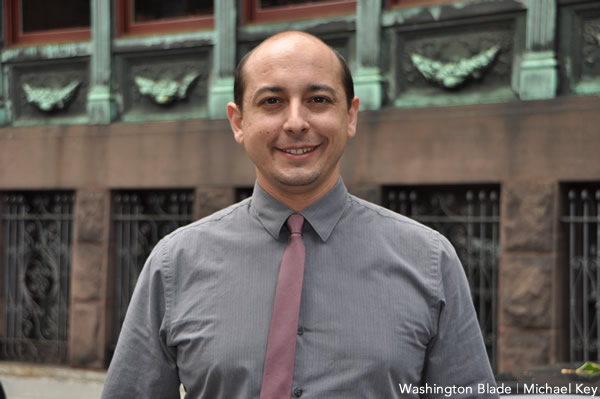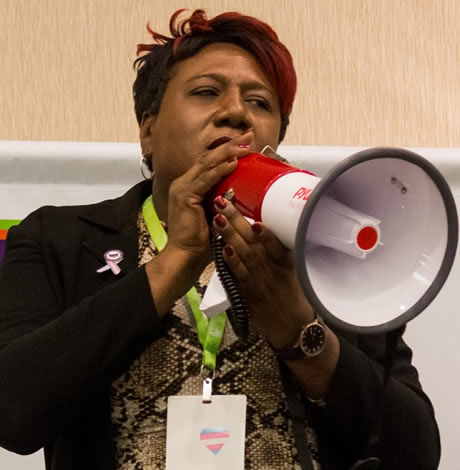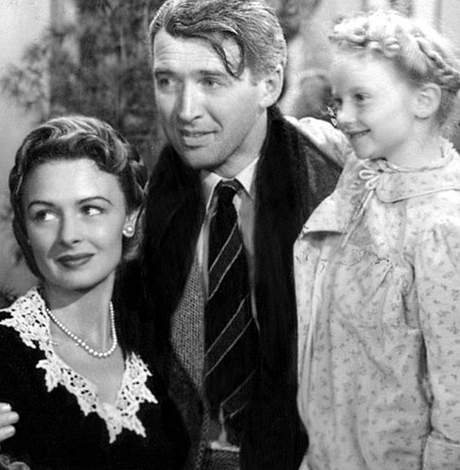Arts & Entertainment
Queery: David Perez
The GLBT Latino History Project president answers 20 gay questions
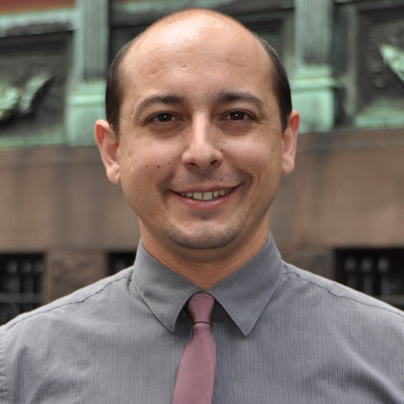
Though David Perez is a few generations removed from the group that came to the U.S. — his great-grandparents on his father’s side immigrated to the U.S. from Mexico — he identifies strongly with his Latino roots and spends his career and volunteer hours working on community advocacy.
By day, he’s director of development at the League of United Latin American Citizens (LULAC) and last May he became president of the D.C.-based Latino GLBT History Project, which is planning an expanded edition of Latino Pride this year. Festivities kick off Sunday and run over four (non-consecutive) days. More details are on page 29 or at latinoglbthistory.org.
Perez, 28, says it’s important for Latino gays to have their own forum in which to gather.
“A lot of the issues are the same, but there are additional issues as well,” he says. “Some things like access to health care, immigration reform, there are some things that affect out community more so while we like to talk about the broad LGBT agenda too, there are Latino-specific issues that are different.”
Perez says last year’s event felt a bit hectic with serious discussion-type events and a dance party all crammed into one day. This year, organizers have spread things out and added elements, such as a church service on June 3.
“We’re really excited about it,” he says. “We’ve gotten a lot of feedback of people who have an interest in seeing Latino Pride grow.”
Perez grew up in Vista., Calif., near San Diego and went to a conservative Christian college near Los Angeles. He came to Washington in 2005 for an internship and went to graduate school at Georgetown University, then stayed. He joined LULAC in 2007. He and boyfriend Gary James have been together 11 months.
Perez lives in Dupont Circle and enjoys volunteering, recreational sports, watching TV and spending time with friends in his free time. (Blade photo by Michael Key)
How long have you been out and who was the hardest person to tell?
I came out in August of 2006 to my friends during my second year of graduate school in D.C. That was fairly simple with a lot of progressive friends. The next time I saw my parents was December 25, 2006 and I told my Mom, Dad, sister and brother because they are very close to me and I wanted to share my life with them. They have been great to me and have treated me no differently than before. The hardest folks to tell were my friends from my conservative evangelical university. However, my close circle of friends there were really great and we are still friends.
Who’s your LGBT hero?
There are so many influential folks in my life. One fellow gay Latino I look up to is Russell Roybal at the National Gay and Lesbian Task Force. He has been involved in LGBT advocacy for many years and I admire is commitment to intersectional community organization to ensure LGBT advocacy includes mobilizing communities around racial and social justice issues as well. I witnessed this first hand at Creating Change this year in Baltimore.
What’s Washington’s best nightspot, past or present?
Rumba Latina at Cobalt is my favorite monthly party. The promoter Johnny Vasquez is hosting a special Latino dance party to raise funds for Latino Pride at Cobalt this Sunday at 10 p.m. Please join us!
Describe your dream wedding.
For my dream wedding, my husband and I would be surrounded by all our friends and families. I am sure it would be a decent size as I would want to invite all my tías and tíos (aunts and uncles). Definitely at a beautiful Episcopal Church.
What non-LGBT issue are you most passionate about?
Latino civil rights in the US. I spend my day-job fundraising for community and advocacy programs for the League of United Latino American Citizens. This is my passion. Fixing our broken immigration reform is a must! It should be LGBT inclusive compressive immigration reform. It’s hard to say if it’s just an LGBT or Latino issue. We need to be building coalitions to work together and support each other’s work.
What historical outcome would you change?
The way history has been written. So many amazing LGBTQ Latinas and Latinos have been left out of the history books. For example, Sylvia Rivera, a Latina Transgender activist, was at the front lines of the Stonewall riots. Latino involvement in LGBT advocacy is not a new thing. We have always been there. The purpose of the Latino GLBT History Project is to collect and preserve those stories and educate the public about the significant contributions of LBGT Latinos to the movement and society in general.
What’s been the most memorable pop culture moment of your lifetime?
Ricky Martin coming out. Though a long time coming, this is a very powerful statement for such a national and international figure to come out, especially for Latinos.
On what do you insist?
Doing your best to love your neighbor as yourself. It’s not always easy, but I feel we should treat all human beings with love and respect even if we disagree.
What was your last Facebook post or Tweet?
DC Latino Pride… Four days of Celebration: May 20th Royal Coronation at Cobalt, May 30th Panel Discussion & Community Resource Fair Human Rights Campaign, June 3rd Ecumenical Service St. Thomas’ Parish & Thursday, June 7th Official Latino Pride Dance Party at Town Danceboutique. Join the fun! www.LatinoGLBTHistory.org
If your life were a book, what would the title be?
“The Little Engine That Could.” I have so many mentors who have inspired me to achieve goals that I never even knew existed, like getting a graduate degree! I try to pass on the love and inspire others to dream big as well.
If science discovered a way to change sexual orientation, what would you do?
Nada (nothing). I love being gay.
What do you believe in beyond the physical world?
I believe in God who loves us all. I worship with my faith community regularly at St. Thomas’ Episcopal Parish Dupont Circle.
What’s your advice for LGBT movement leaders?
Build coalitions and work together. Commit yourself to diversity and inclusiveness. It might take a lot of work, but will be stronger partnerships for the long-term goals of the movement.
What would you walk across hot coals for?
My man, Gary
What LGBT stereotype annoys you most?
Assuming we always have to be the ones at the office to plan the party. Though I do love to plan parties.
What’s your favorite LGBT movie?
“The Broken Hearts Club.” I love softball and it’s an overall great movie.
What’s the most overrated social custom?
On Facebook, adding everyone who requests to be your “friend” even if you don’t know them.
What trophy or prize do you most covet?
I was really touched when the LULAC Youth gave me a medal after helping them paint murals in Latino neighborhoods of Chicago and north of Columbia Heights. It was totally unexpected and a project totally out of my normal duties. It was touching to see how much they enjoyed it.
What do you wish you’d known at 18?
College is expensive. Save up early!
Why Washington?
I first came to Washington, D.C. for an internship with my congressman. I loved politics and the West Wing. I came back for graduate school at Georgetown University. Stayed here working ever since. It is where I came out and is my current home.
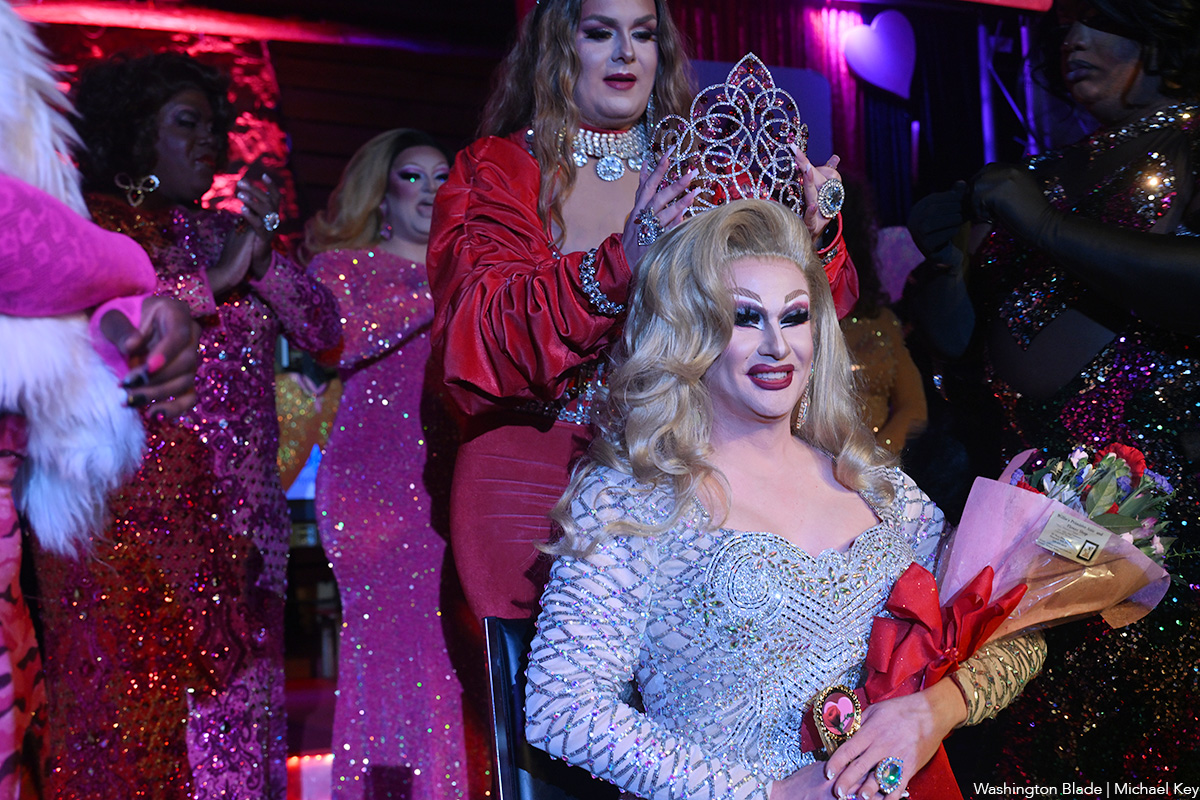
The 44th annual Queen of Hearts pageant was held at The Lodge in Boonsboro, Md. on Friday, Feb. 20. Six contestants vied for the title and Bev was crowned the winner.
(Washington Blade photos by Michael Key)
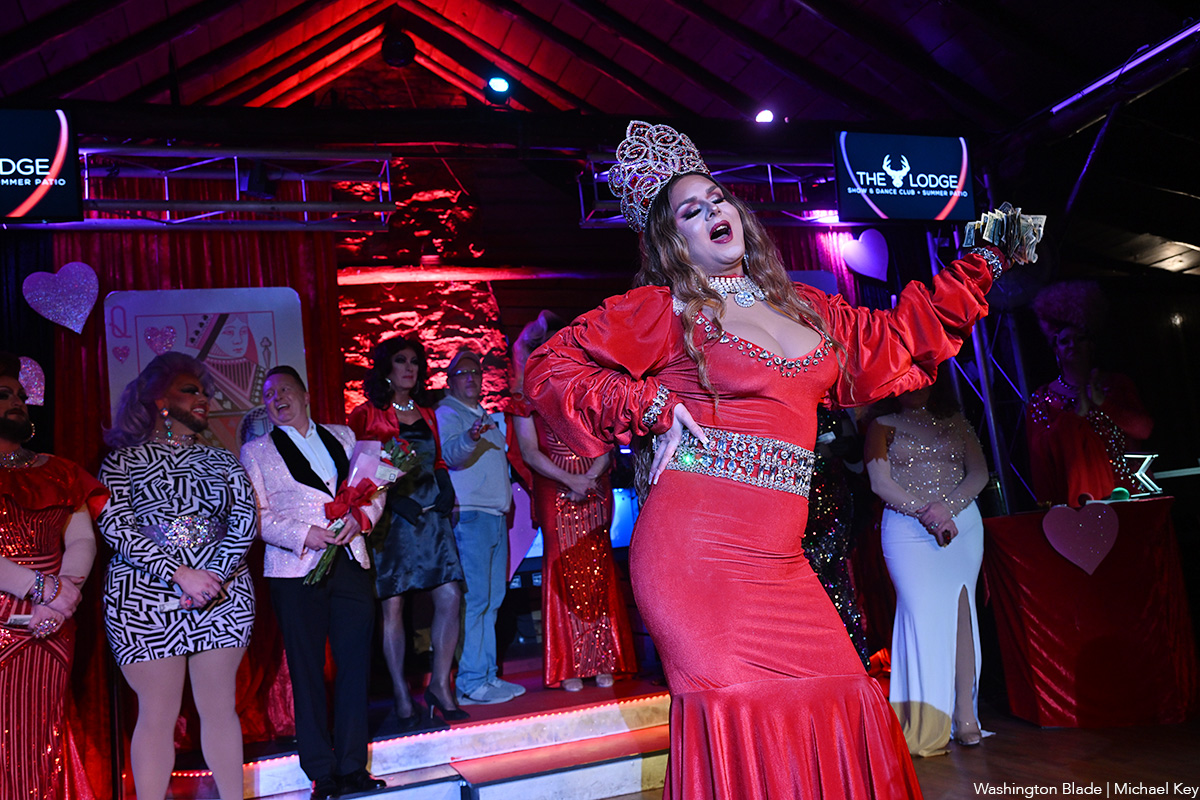
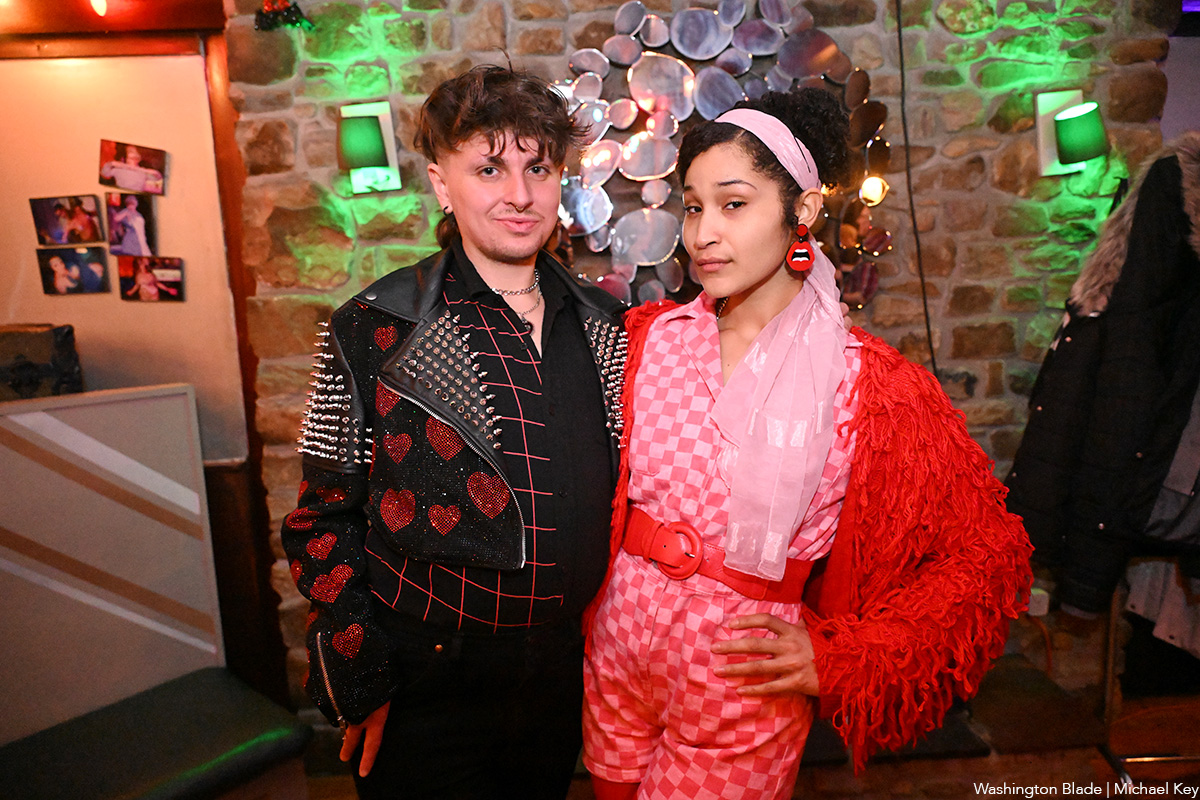
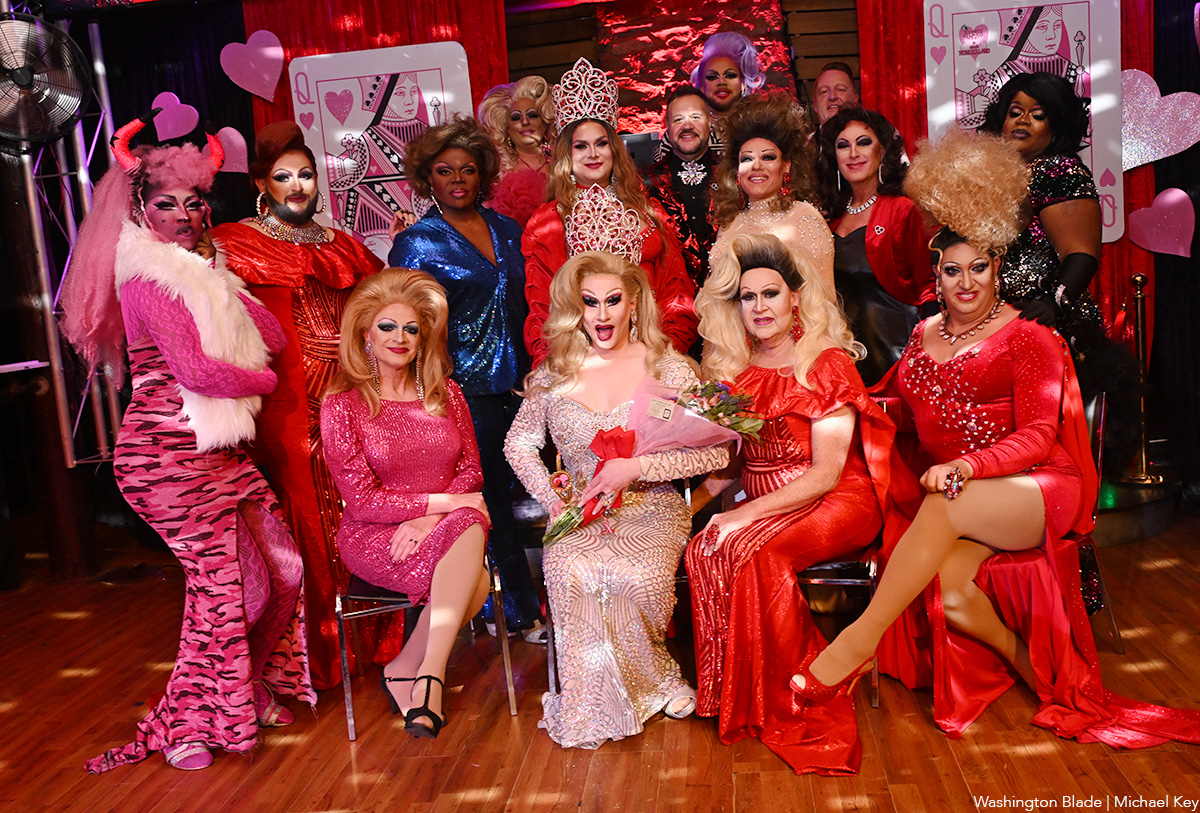
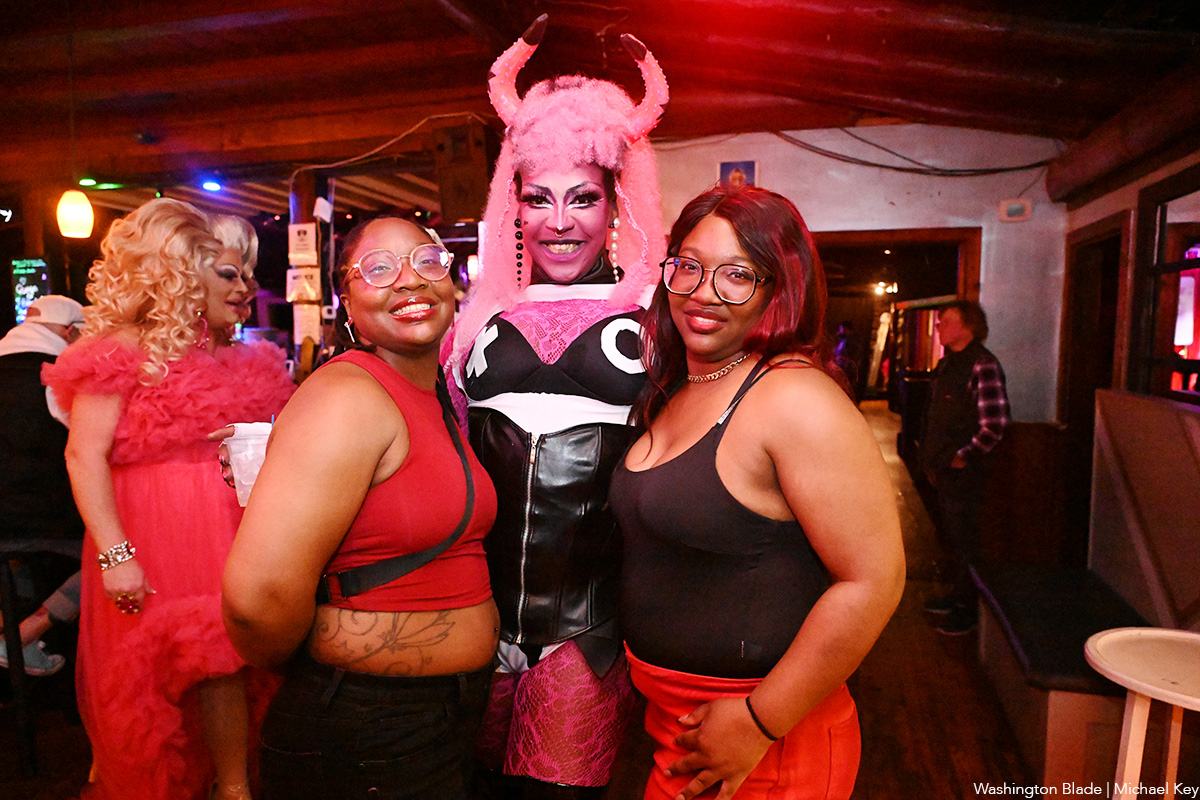
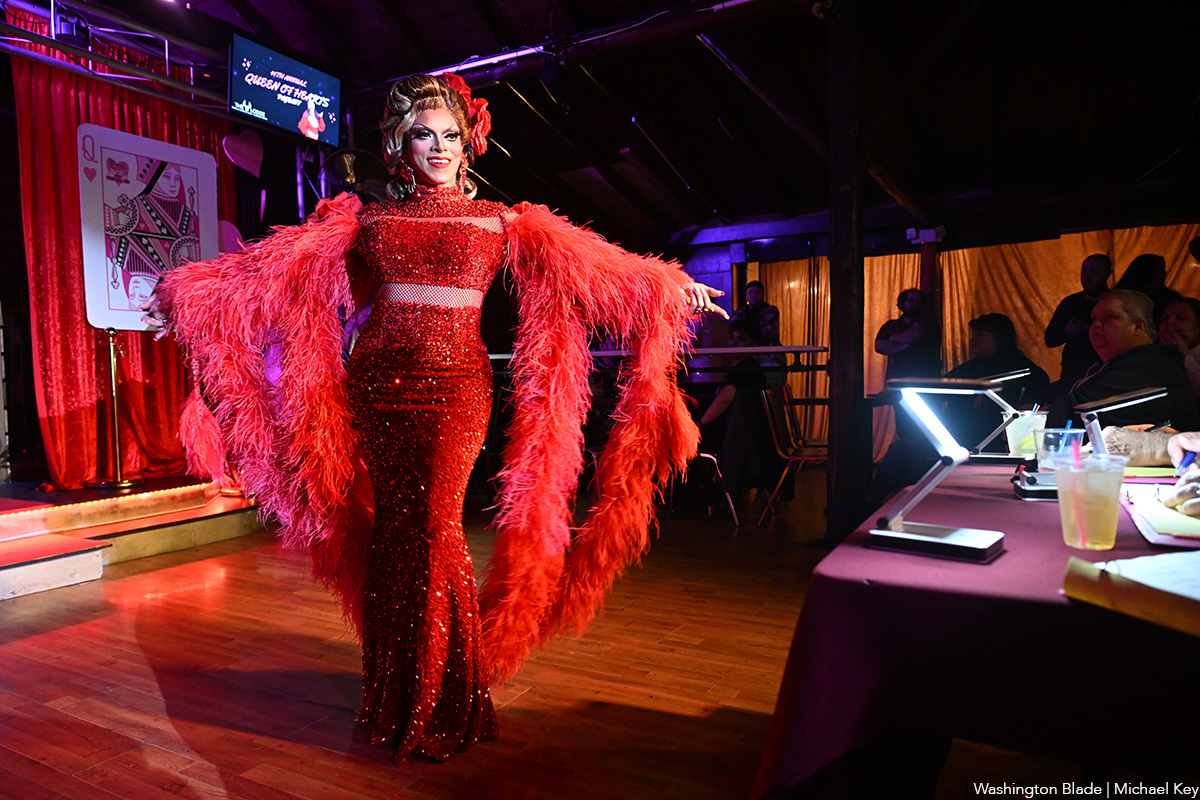
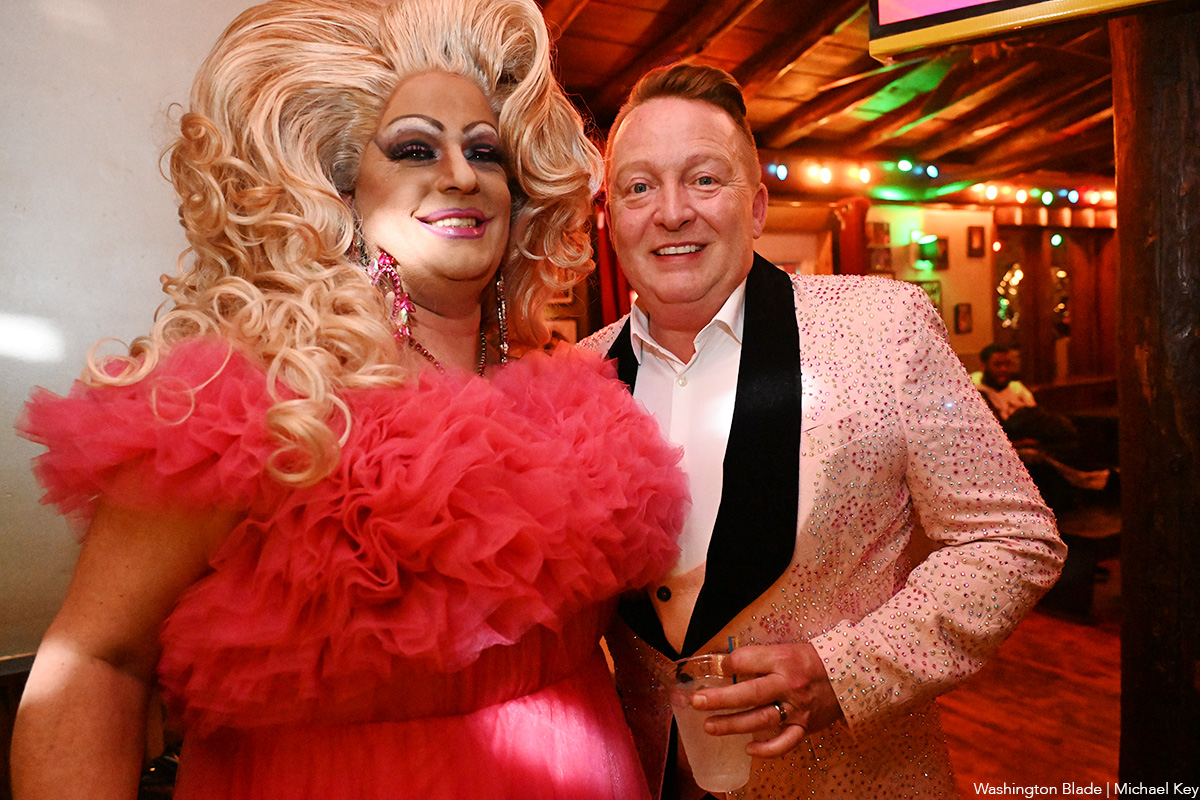
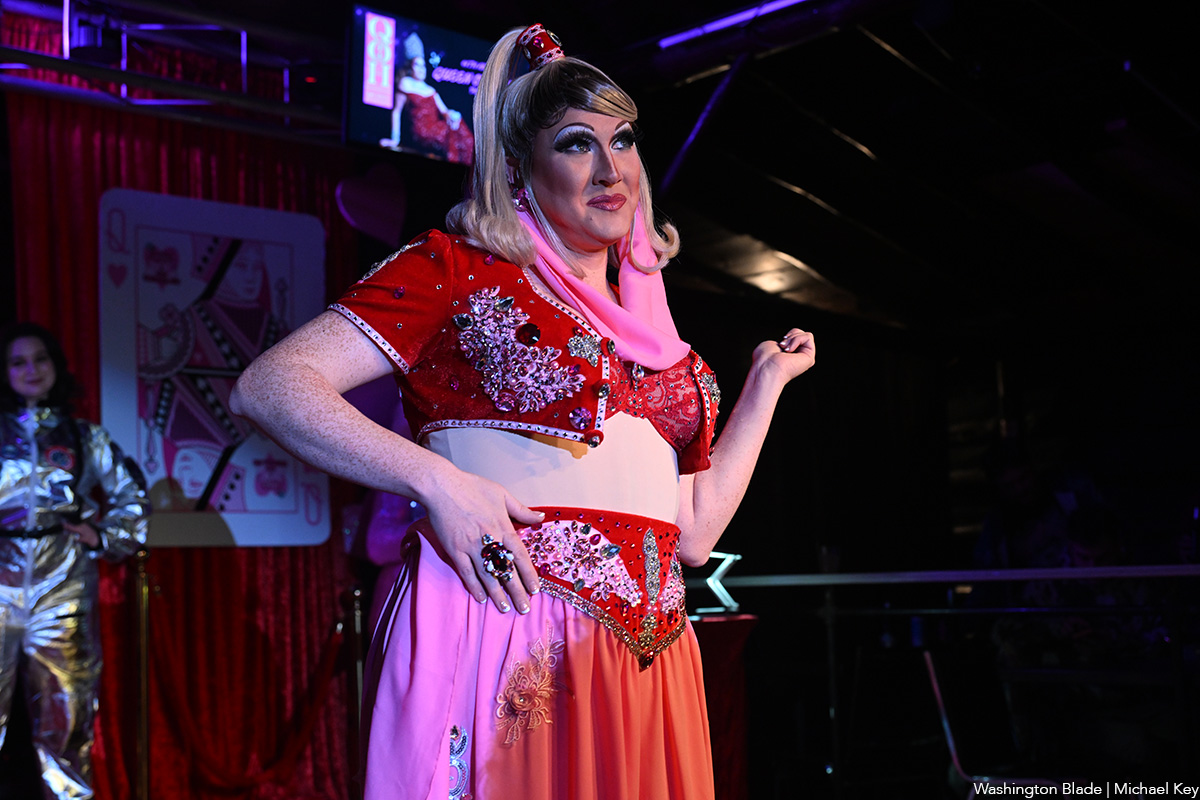

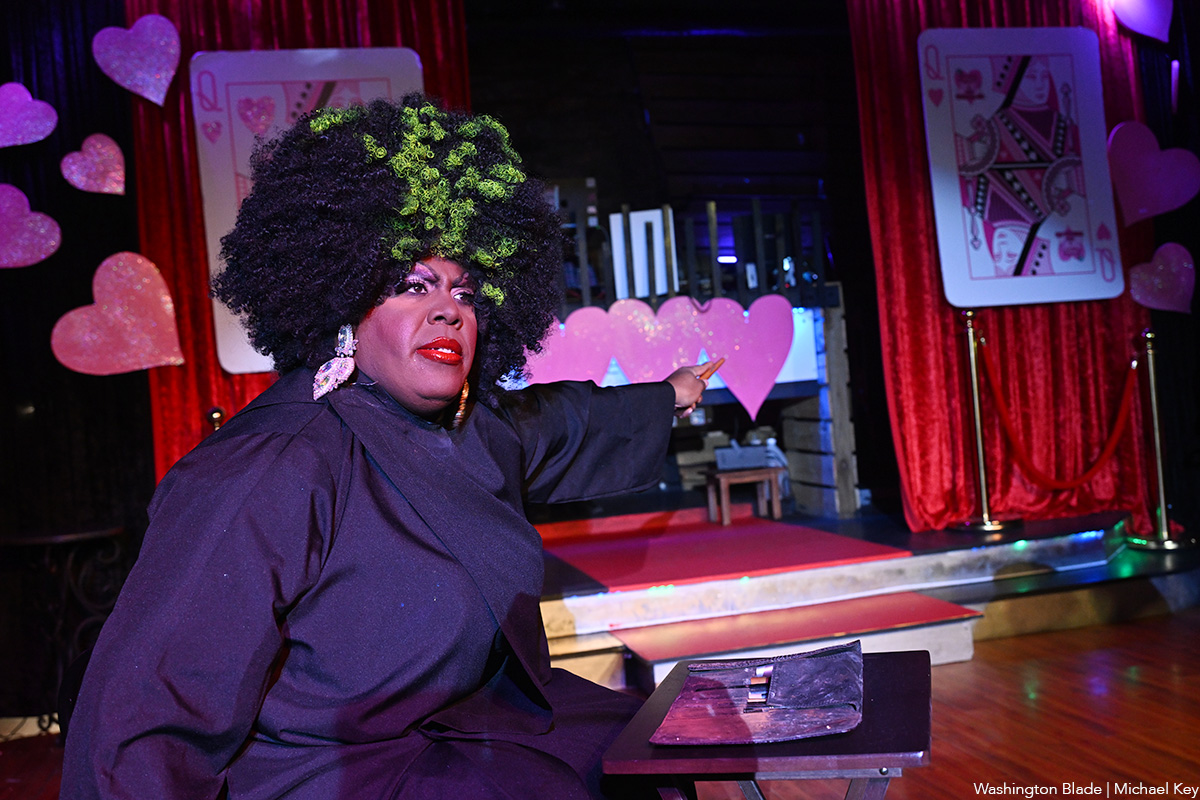
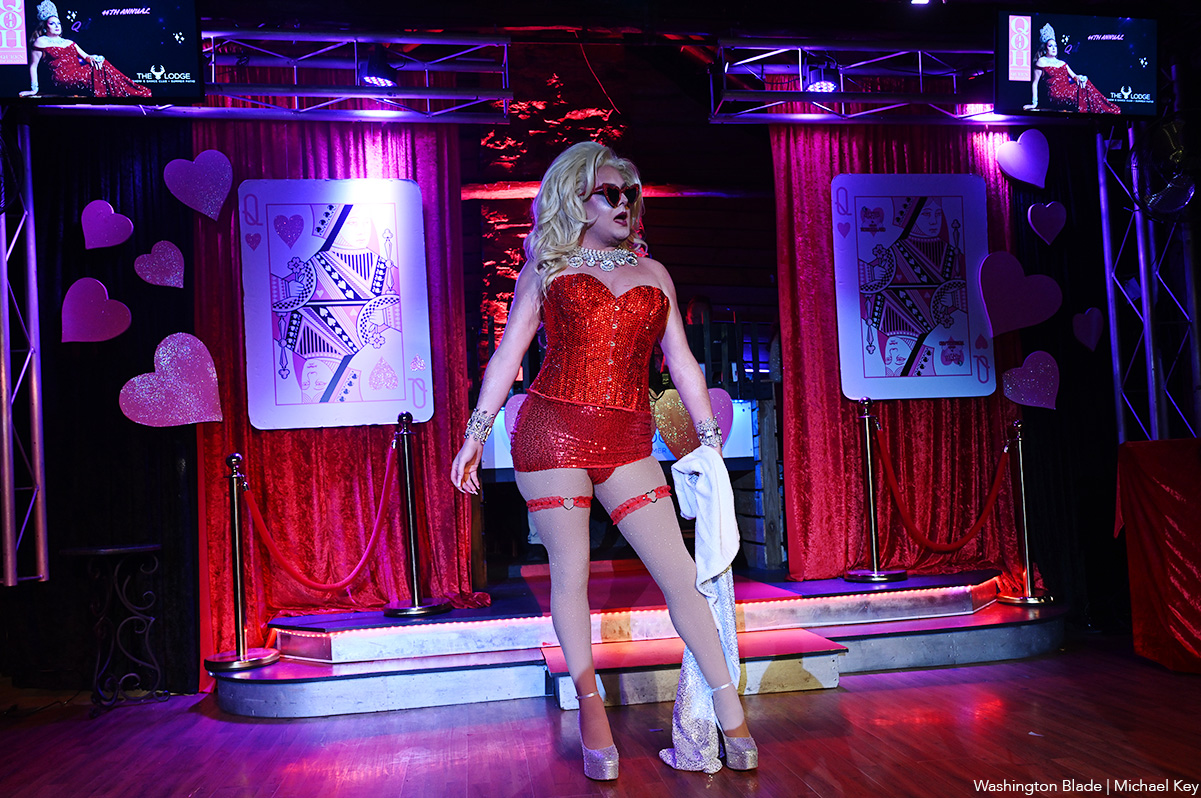
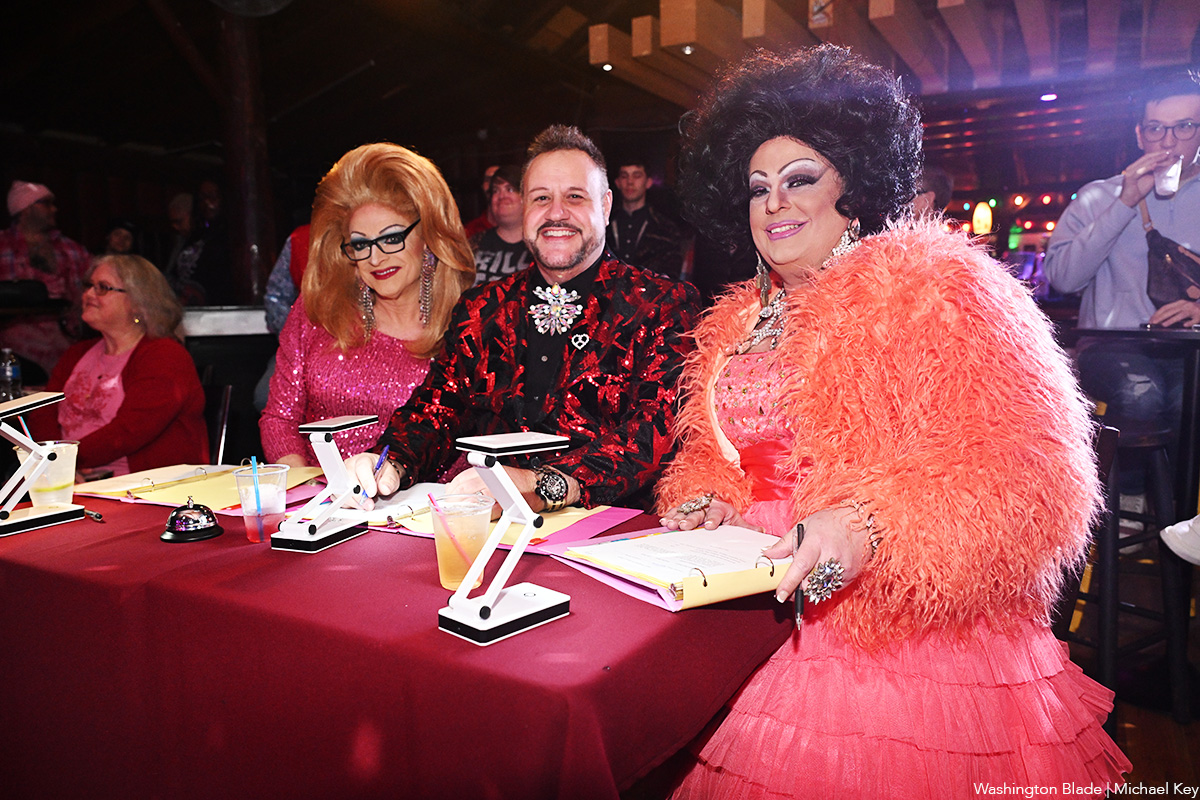
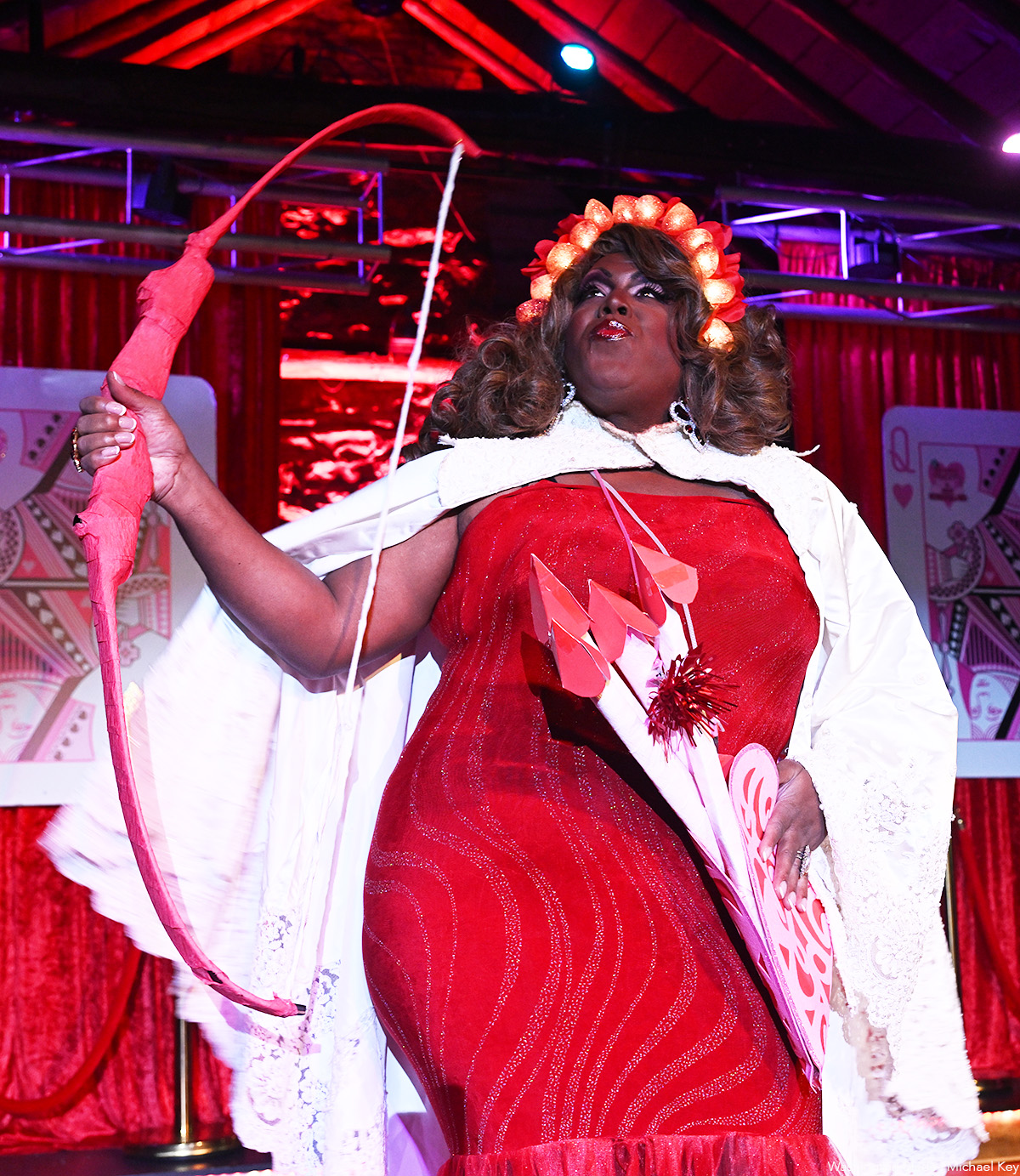
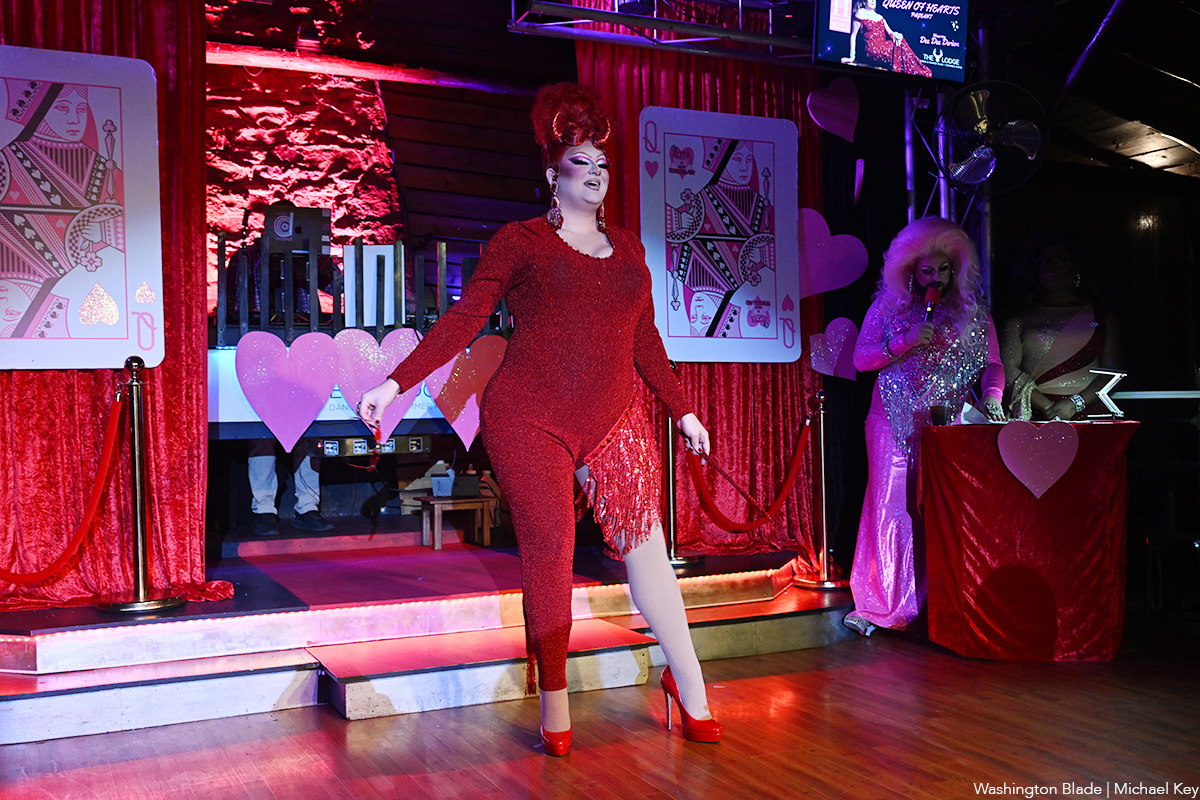
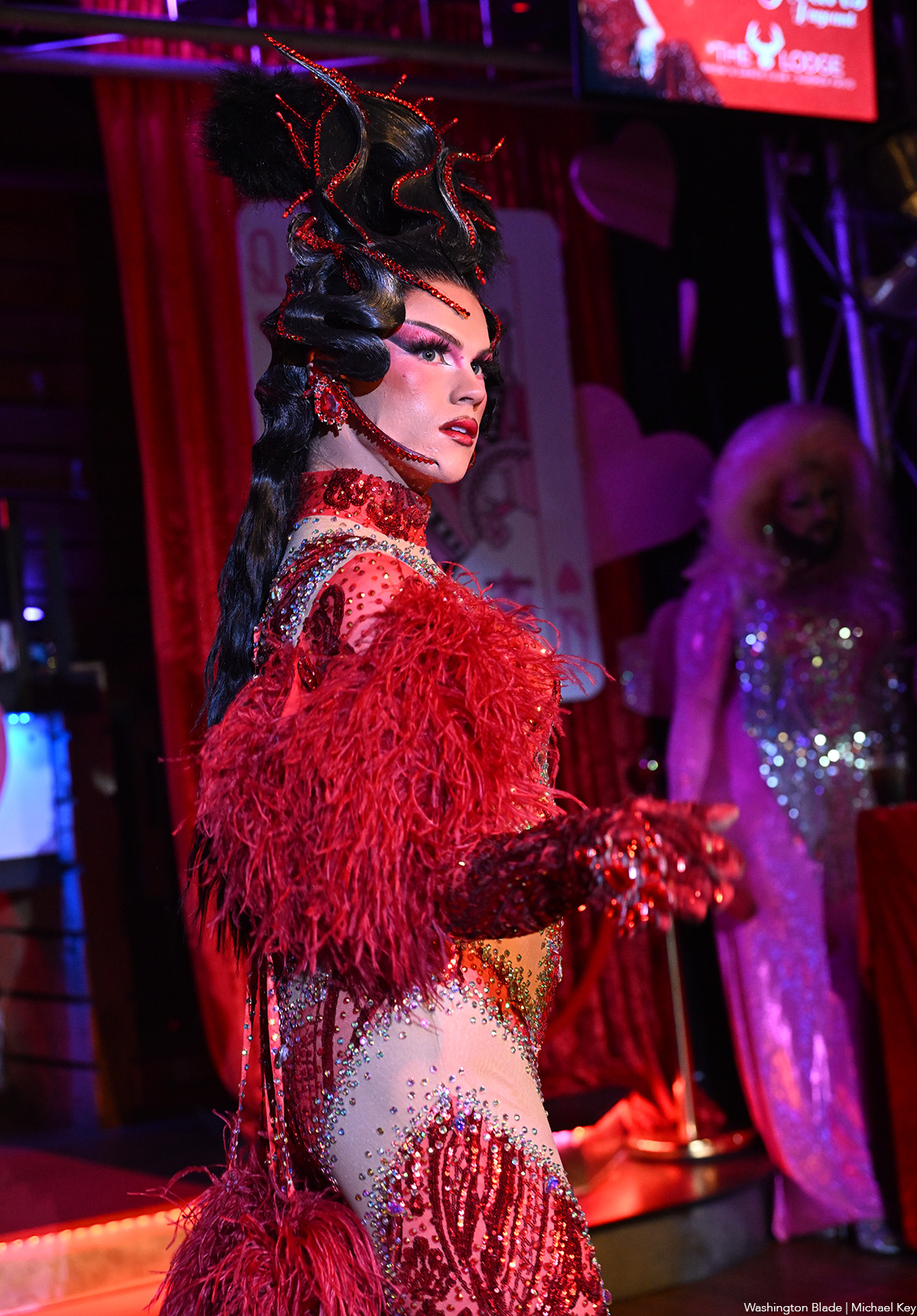
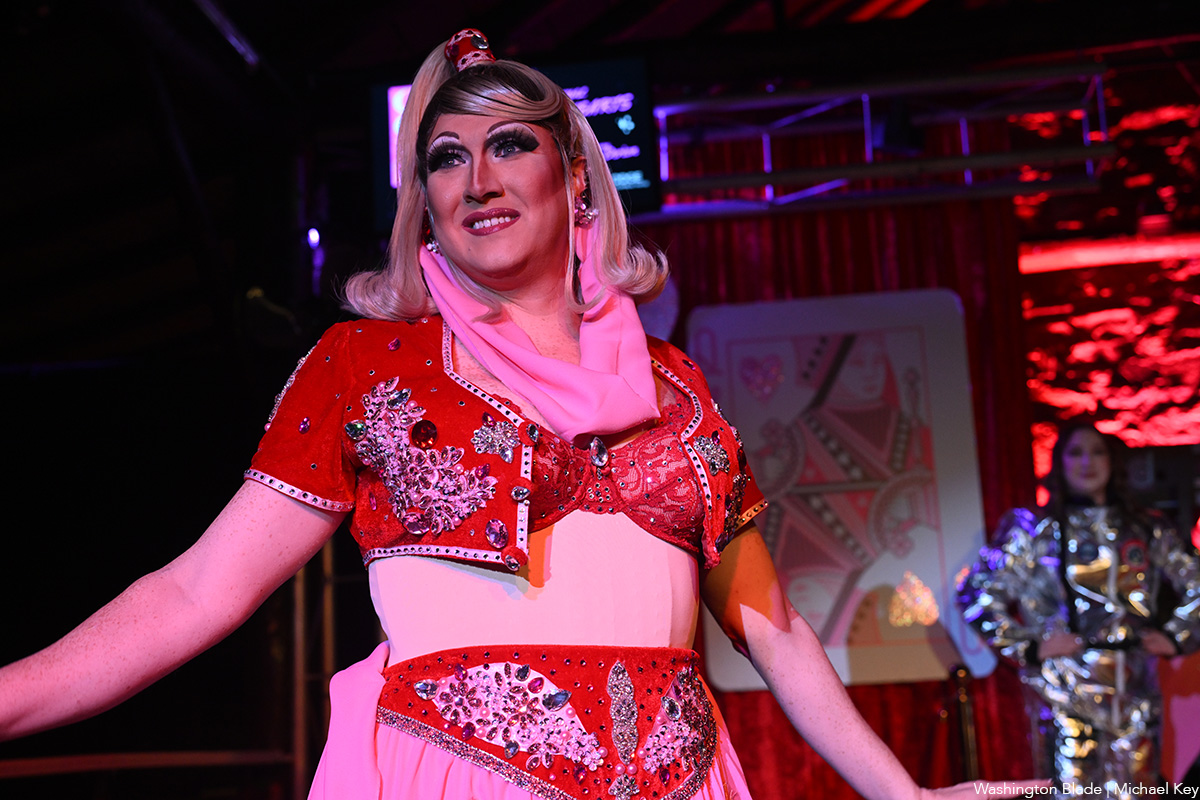
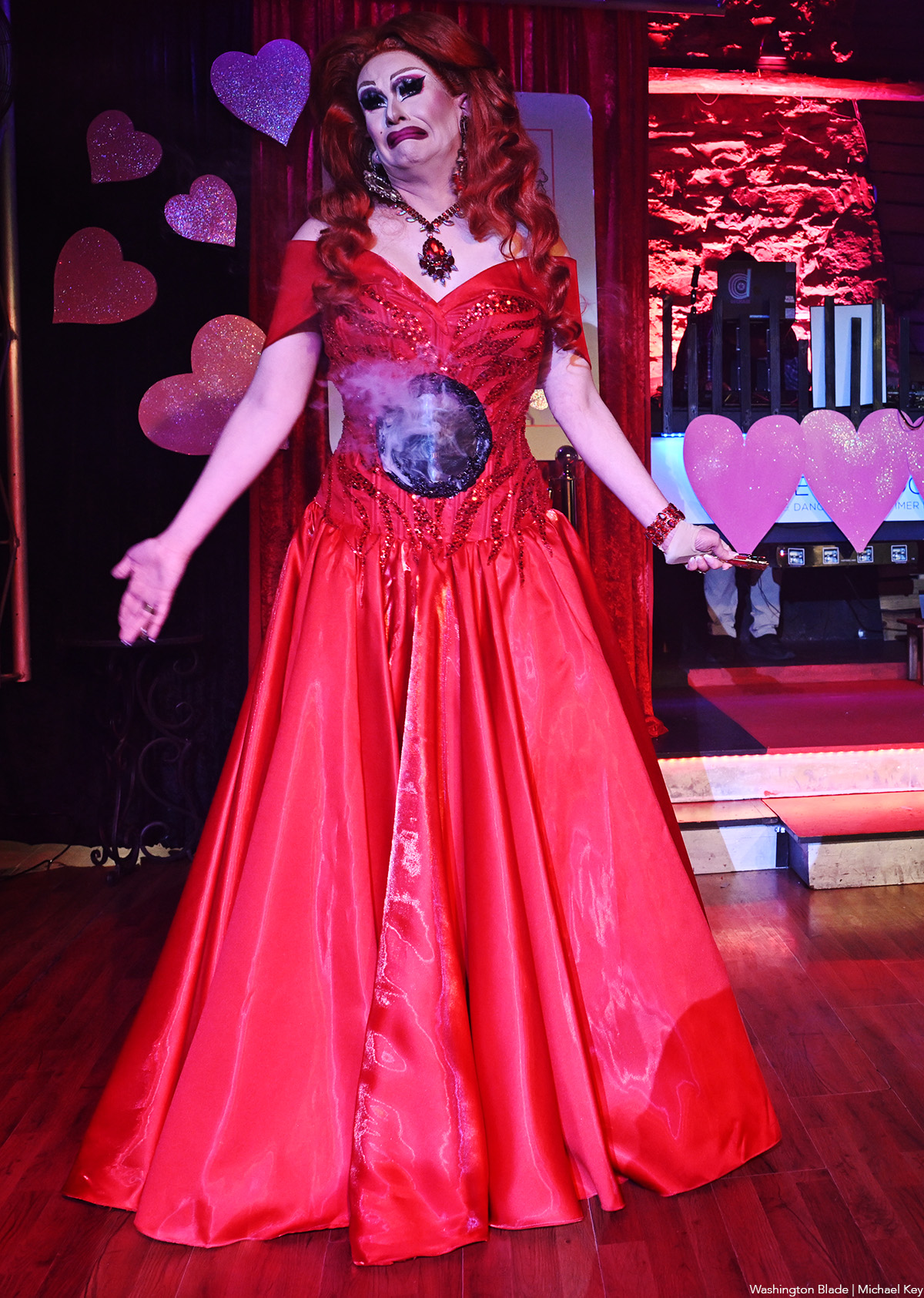
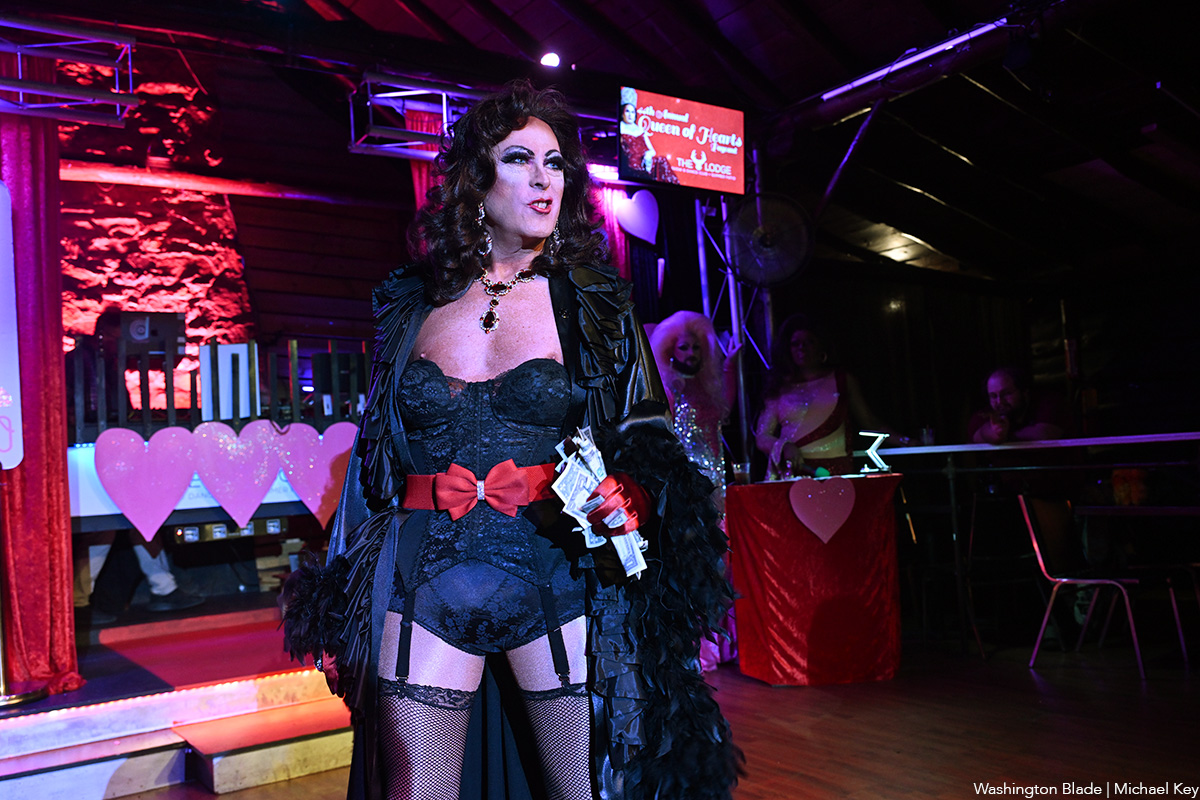
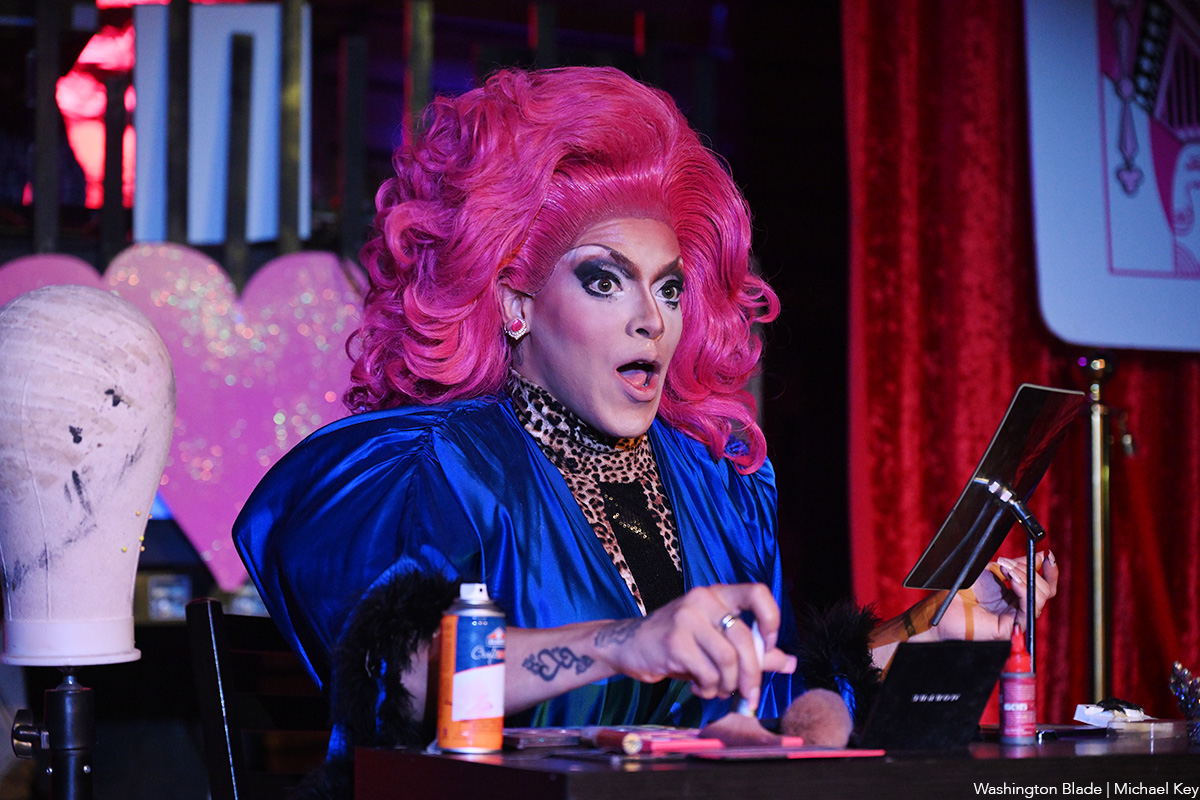
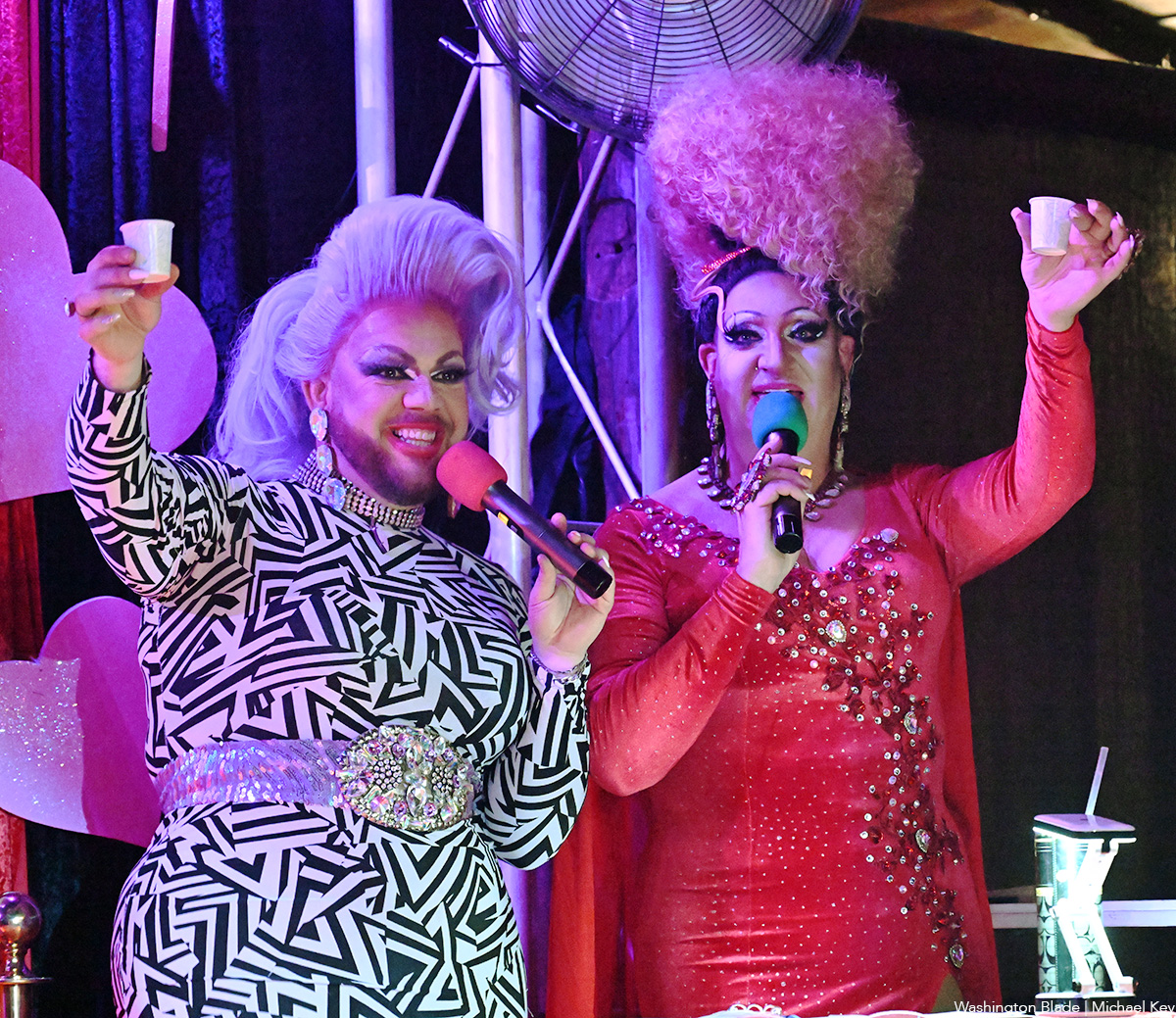

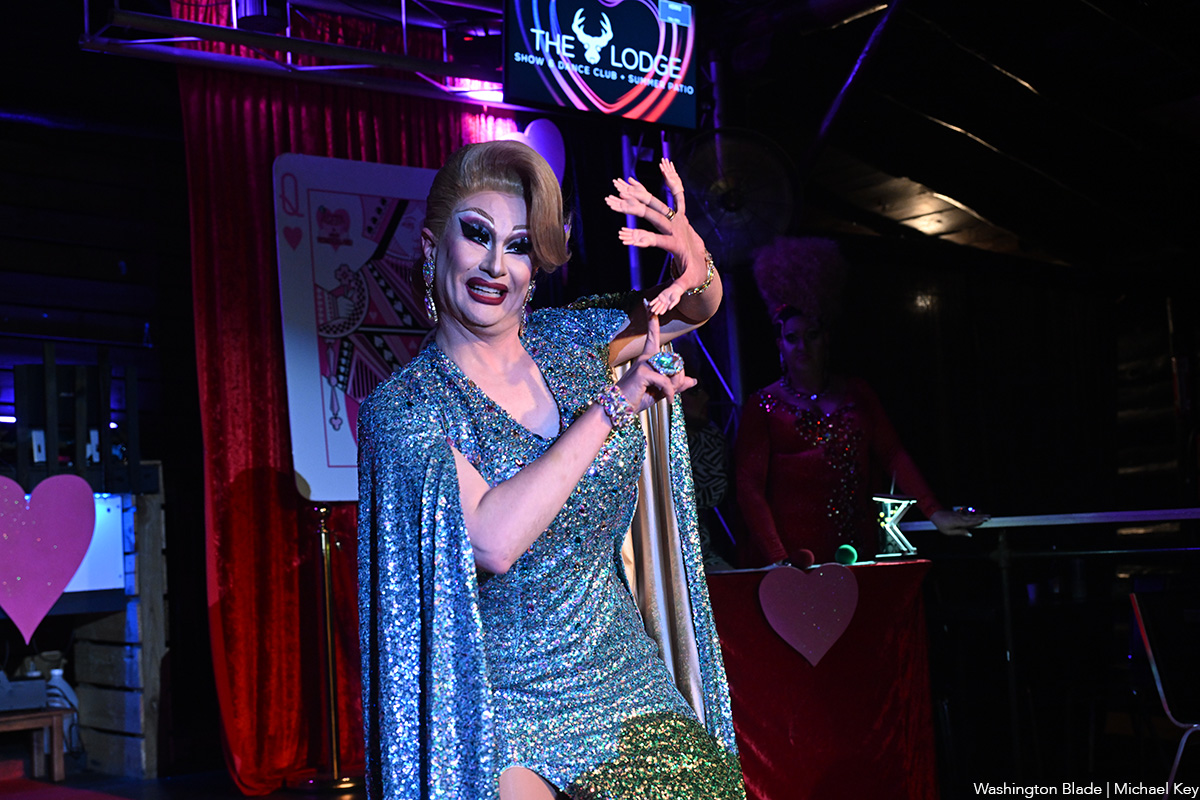
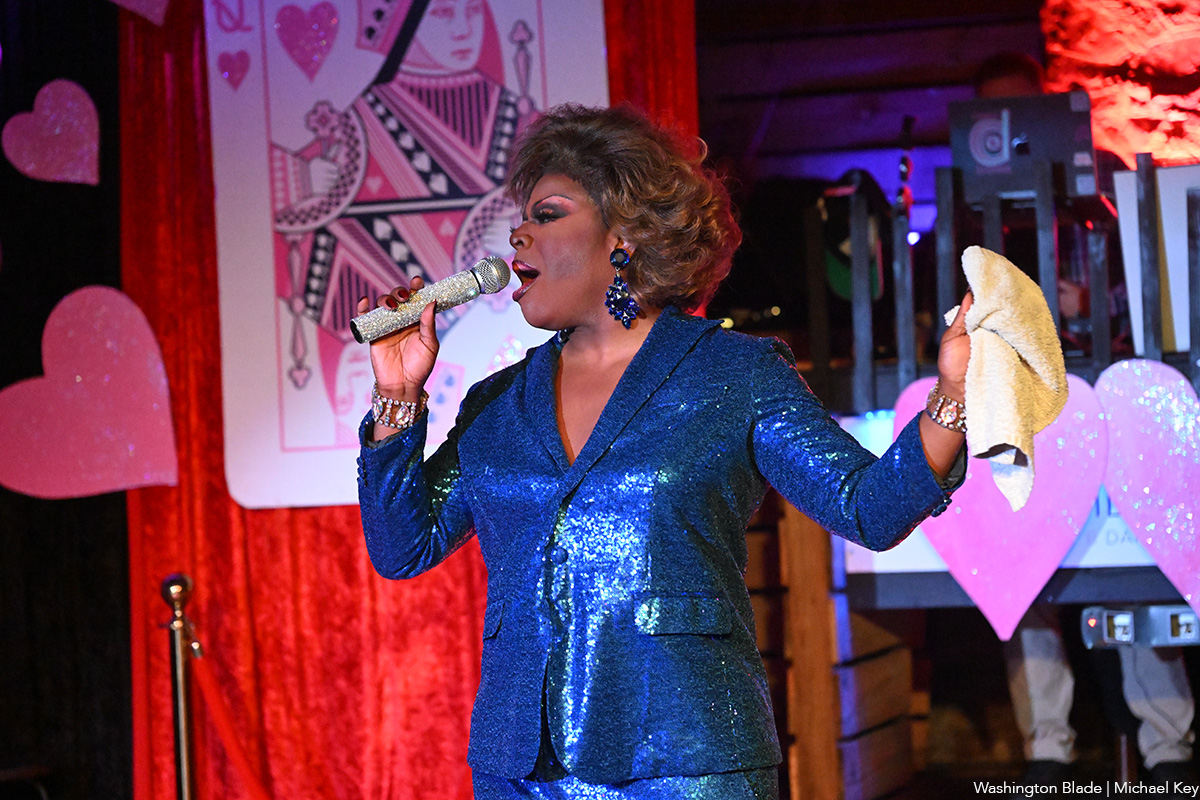
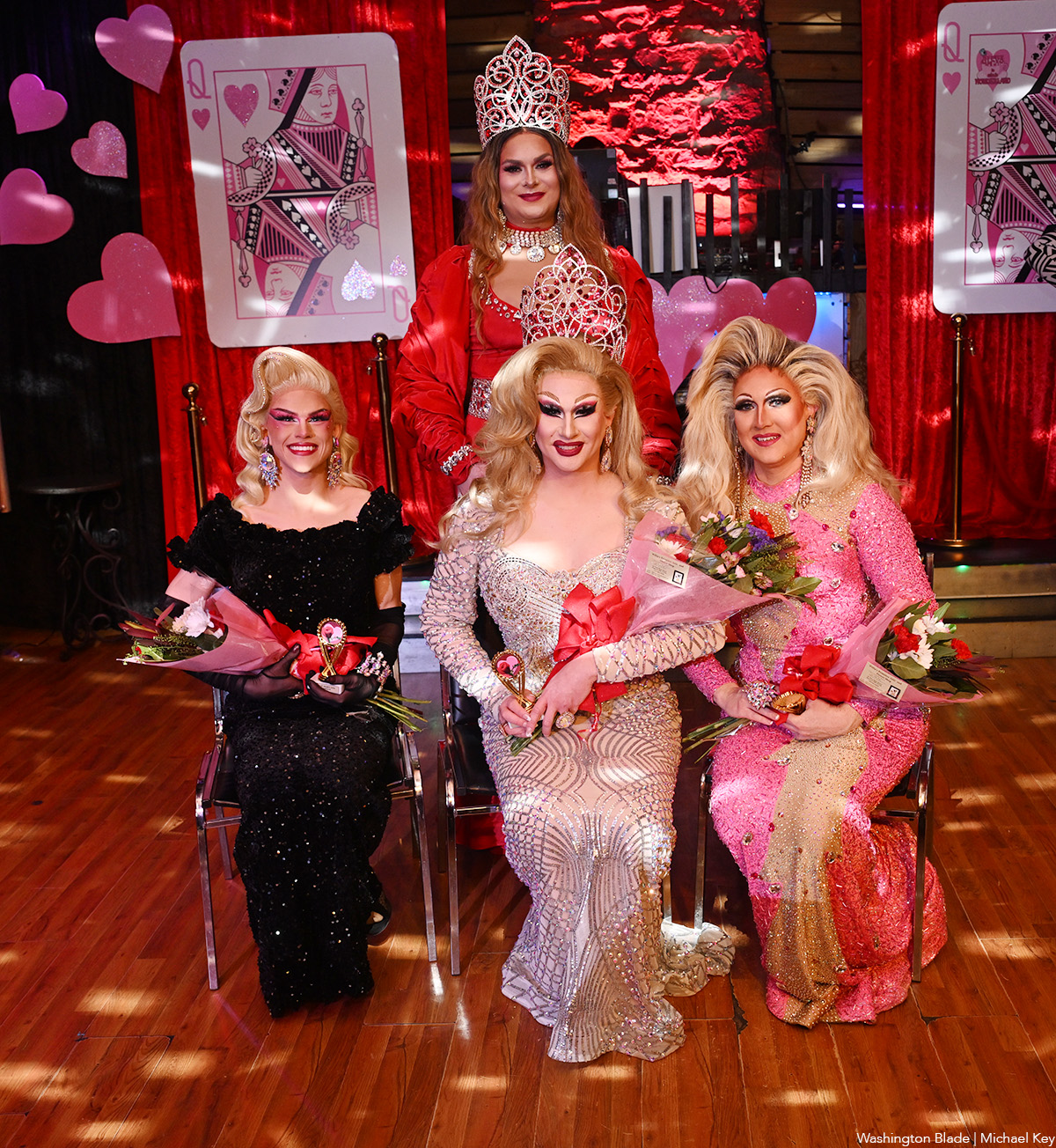
View on Threads
Books
New book profiles LGBTQ Ukrainians, documents war experiences
Tuesday marks four years since Russia attacked Ukraine

Journalist J. Lester Feder’s new book profiles LGBTQ Ukrainians and their experiences during Russia’s war against their country.
Feder for “The Queer Face of War: Portraits and Stories from Ukraine” interviewed and photographed LGBTQ Ukrainians in Kyiv, the country’s capital, and in other cities. They include Olena Hloba, the co-founder of Tergo, a support group for parents and friends of LGBTQ Ukrainians, who fled her home in the Kyiv suburb of Bucha shortly after Russia launched its war on Feb. 24, 2022.
Russian soldiers killed civilians as they withdrew from Bucha. Videos and photographs that emerged from the Kyiv suburb showed dead bodies with their hands tied behind their back and other signs of torture.

Olena Shevchenko, chair of Insight, a Ukrainian LGBTQ rights group, wrote the book’s forward.

The book also profiles Viktor Pylypenko, a gay man who the Ukrainian military assigned to the 72nd Mechanized Black Cossack Brigade after the war began. Feder writes Pylypenko’s unit “was deployed to some of the fiercest and most important battles of the war.”
“The brigade was pivotal to beating Russian forces back from Kyiv in their initial attempt to take the capital, helping them liberate territory near Kharkiv and defending the front lines in Donbas,” wrote Feder.
Pylypenko spent two years fighting “on Ukraine’s most dangerous battlefields, serving primarily as a medic.”
“At times he felt he was living in a horror movie, watching tank shells tear his fellow soldiers apart before his eyes,” wrote Feder. “He held many men as they took their final breaths. Of the roughly one hundred who entered the unit with him, only six remained when he was discharged in 2024. He didn’t leave by choice: he went home to take care of his father, who had suffered a stroke.”
Feder notes one of Pylypenko’s former commanders attacked him online when he came out. Pylypenko said another commander defended him.
Feder also profiled Diana and Oleksii Polukhin, two residents of Kherson, a port city in southern Ukraine that is near the mouth of the Dnieper River.
Ukrainian forces regained control of Kherson in November 2022, nine months after Russia occupied it.
Diana, a cigarette vender, and Polukhin told Feder that Russian forces demanded they disclose the names of other LGBTQ Ukrainians in Kherson. Russian forces also tortured Diana and Polukhin while in their custody.
Polukhim is the first LGBTQ victim of Russian persecution to report their case to Ukrainian prosecutors.

Feder, who is of Ukrainian descent, first visited Ukraine in 2013 when he wrote for BuzzFeed.
He was Outright International’s Senior Fellow for Emergency Research from 2021-2023. Feder last traveled to Ukraine in December 2024.
Feder spoke about his book at Politics and Prose at the Wharf in Southwest D.C. on Feb. 6. The Washington Blade spoke with Feder on Feb. 20.
Feder told the Blade he began to work on the book when he was at Outright International and working with humanitarian groups on how to better serve LGBTQ Ukrainians. Feder said military service requirements, a lack of access to hormone therapy and documents that accurately reflect a person’s gender identity and LGBTQ-friendly shelters are among the myriad challenges that LGBTQ Ukrainians have faced since the war began.
“All of these were components of a queer experience of war that was not well documented, and we had never seen in one place, especially with photos,” he told the Blade. “I felt really called to do that, not only because of what was happening in Ukraine, but also as a way to bring to the surface issues that we’d had seen in Iraq and Syria and Afghanistan.”

Feder also spoke with the Blade about the war’s geopolitical implications.
Russian President Vladimir Putin in 2013 signed a law that bans the “promotion of homosexuality” to minors.
The 2014 Winter Olympics took place in Sochi, a Russian resort city on the Black Sea. Russia annexed Crimea from Ukraine a few weeks after the games ended.
Russia’s anti-LGBTQ crackdown has continued over the last decade.
The Russian Supreme Court in 2023 ruled the “international LGBT movement” is an extremist organization and banned it. The Russian Justice Ministry last month designated ILGA World, a global LGBTQ and intersex rights group, as an “undesirable” organization.
Ukraine, meanwhile, has sought to align itself with Europe.
Ukrainian President Volodymyr Zelenskyy after a 2021 meeting with then-President Joe Biden at the White House said his country would continue to fight discrimination based on sexual orientation and gender identity. (Zelenskyy’s relationship with the U.S. has grown more tense since the Trump-Vance administration took office.) Zelenskyy in 2022 publicly backed civil partnerships for same-sex couples.
Then-Ukrainian Ambassador to the U.S. Oksana Markarova in 2023 applauded Kyiv Pride and other LGBTQ and intersex rights groups in her country when she spoke at a photo exhibit at Ukraine House in D.C. that highlighted LGBTQ and intersex soldiers. Then-Kyiv Pride Executive Director Lenny Emson, who Feder profiles in his book, was among those who attended the event.
“Thank you for everything you do in Kyiv, and thank you for everything that you do in order to fight the discrimination that still is somewhere in Ukraine,” said Markarova. “Not everything is perfect yet, but you know, I think we are moving in the right direction. And we together will not only fight the external enemy, but also will see equality.”
Feder in response to the Blade’s question about why he decided to write his book said he “didn’t feel” the “significance of Russia’s war against Ukraine” for LGBTQ people around the world “was fully understood.”
“This was an opportunity to tell that big story,” he said.
“The crackdown on LGBT rights inside Russia was essentially a laboratory for a strategy of attacking democratic values by attacking queer rights and it was one as Ukraine was getting closet to Europe back in 2013, 2014,” he added. “It was a strategy they were using as part of their foreign policy, and it was one they were using not only in Ukraine over the past decade, but around the world.”
Feder said Republicans are using “that same strategy to attack queer people, to attack democracy itself.”
“I felt like it was important that Americans understand that history,” he said.

More than a dozen LGBTQ athletes won medals at the Milan Cortina Winter Olympics that ended on Sunday.
Cayla Barnes, Hilary Knight, and Alex Carpenter are LGBTQ members of the U.S. women’s hockey team that won a gold medal after they defeated Canada in overtime. Knight the day before the Feb. 19 match proposed to her girlfriend, Brittany Bowe, an Olympic speed skater.
French ice dancer Guillaume Cizeron, who is gay, and his partner Laurence Fournier Beaudry won gold. American alpine skier Breezy Johnson, who is bisexual, won gold in the women’s downhill. Amber Glenn, who identifies as bisexual and pansexual, was part of the American figure skating team that won gold in the team event.
Swiss freestyle skier Mathilde Gremaud, who is in a relationship with Vali Höll, an Austrian mountain biker, won gold in women’s freeski slopestyle.
Bruce Mouat, who is the captain of the British curling team that won a silver medal, is gay. Six members of the Canadian women’s hockey team — Emily Clark, Erin Ambrose, Emerance Maschmeyer, Brianne Jenner, Laura Stacey, and Marie-Philip Poulin — that won silver are LGBTQ.
Swedish freestyle skier Sandra Naeslund, who is a lesbian, won a bronze medal in ski cross.
Belgian speed skater Tineke den Dulk, who is bisexual, was part of her country’s mixed 2000-meter relay that won bronze. Canadian ice dancer Paul Poirier, who is gay, and his partner, Piper Gilles, won bronze.
Laura Zimmermann, who is queer, is a member of the Swiss women’s hockey team that won bronze when they defeated Sweden.
Outsports.com notes all of the LGBTQ Olympians who competed at the games and who medaled.
-

 District of Columbia4 days ago
District of Columbia4 days agoJudge rescinds order against activist in Capital Pride lawsuit
-

 District of Columbia4 days ago
District of Columbia4 days agoTrans activists arrested outside HHS headquarters in D.C.
-

 Opinions4 days ago
Opinions4 days agoHow do we honor Renee Good, Alex Pretti?
-

 Sports5 days ago
Sports5 days agoUS wins Olympic gold medal in women’s hockey

